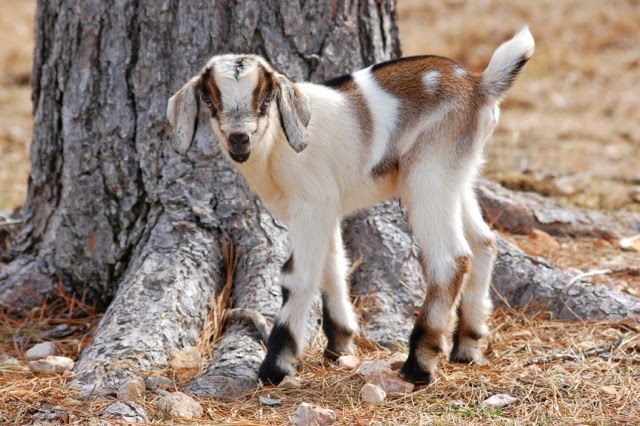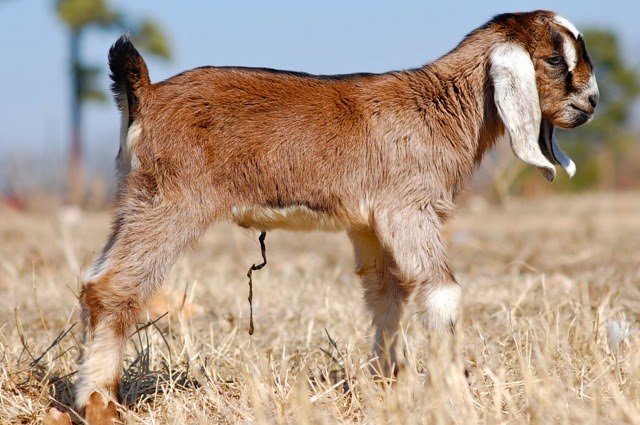Tuesday, March 18, 2014
Cheesemaking!
Posted by Good Goats at 9:55 AM 5 comments
Wednesday, March 12, 2014
Lots of photos!
Posted by Good Goats at 9:25 AM 3 comments
Wednesday, February 12, 2014
Kid pics!
Posted by Good Goats at 2:48 PM 1 comments
Wednesday, February 5, 2014
Kidding Season is here!
Just a quick note to say kidding season has started here. Yesterday Wheezee - one of our spotted Nubian does - kidded to a big healthy single buckling who is brown/white spotted. Then a few hours later our big paint Boer doe kidded to another single spotted (blonde/white/black) buckling. Both are out of our spotted Nubian boy from last year - Heartbreaker.
What a way to start kidding season - 2 single boys? Hopefully this isn't a representation of what the rest of the year holds ;). But they were both super easy kiddings and everyone is healthy... I'll take that any day.
Pictures later, Lord willing!
Suriyah
Posted by Good Goats at 9:06 AM 0 comments
Thursday, January 16, 2014
Sad News
I have not blogged for a long time, I know, I'm sorry. Life has been busy as usual. All the does are bred, and kidding should start February 1st. In the meantime, we are enjoying a little "vacation" with chores being so easy - we only have 5 does in milk that we are milking once a day, there are no kids to bottle and feeding is a pretty easy chore. I am enjoying my sleep-in time while it lasts, because the kidding chart is filled which means lots of fun and not much rest in just a few short weeks :).
Today I have some sad news to share with you though. If you have been a follower of my blog I am sure you have seen posts about a little goat named Trauma. She was a single kid born in March of 2012, who was born with a deformity - a crooked neck. From the moment she was born her sweet little face made her so hard to not fall in love with. We named her Trauma, I gave her lots of loving care. She learned how to walk and would come to her name like a puppy. She acted more like a dog than a goat, and was always in the milk room during milking time.
She lived with not too much trouble considering her crooked neck, but always seemed to have a little trouble breathing because of the way her neck was shaped and very often had a runny nose - which was fixed with a little tissue ;). The past few weeks tho she has seemed to not be doing too well. I did what I could but last night I knew it was time for her to go and she passed away laying in the fluffy straw she slept in every night.
Posted by Good Goats at 10:31 AM 2 comments
Wednesday, October 16, 2013
Random Photos
Suriyah
Posted by Good Goats at 12:46 PM 0 comments
Wednesday, September 25, 2013
Goat Wormers
I was asked to type up the many different types of wormers that can be used on goats. So, here we go.
My personal favorites as far as how well they work are the injectable Tramisole (levamisole) and Cydectin Pour-On (given orally to goats). Tramisole is unfortunately not on the market anymore to my knowledge - thankfully I have a large bottle given to me by an old time breeder. I only use the Tramisole sparingly due to this, and usually use Cydectin with good success.
No goat rearing is going to be successful and worm free, especially here in the wet south, without proper feed, watering, minerals and worming - all on a good, consistent schedule. One way to help keep worms under control is by copper bolusing. Copper bolus' help keep the worm population under control, especially in the cases of bottle jaw. Goats should be copped bolused 3-4 times a year.
Another great way, and really the only way to tell which kind of wormer you should use on your herd, is by doing fecal testing. Many people do this on their own with their own microscope. If you do not know how to do that, ask your vet. Most vets only charge $10-$15 for a fecal sampling.
Disclaimer: I am not a vet. Use these dosages at your own risk. These are the dosages that have worked for many years for many goat breeders. Always use medication with caution and correctly weigh your animal.
Goats metabolize wormers differently than other animals - drugs clear their system faster. As a result, goats require higher doses of wormers for effective treatment. Most of the wormers available for use on livestock are not labeled for us in goats and so are not labeled with the correct dose for goats. For a treatment to be effective, you need to use the correct dose. Please not that most of the doses given for goats on this site are "extra label" (Extra label means that the dosage given for goats differs from that found on the bottle and/or the FDA has not cleared their use in goats).
These are the name brands and then the class of wormer. There are other wormers on the market, but these are the most commonly used and most effective in goats.
Ivomec - Ivermectin
Treatment & control of: Lungworms, gastrointestinal roundworms, larvae, lice, mange mites & cattle grubs. External parasites.
Dosage:
Given orally to goats, at the rate of 1 cc per 50 lbs. Lately, many breeders have been using a higher dosage at the rate of 1 cc per 34 lbs with great success.
Safe for use in pregnant does.
Valbazen - Albendazole
Treatment & control of: Lungworms, gastrointestinal roundworms, stomach worms, tapeworms, intestinal worms & liver flukes (adult).
Dosage: 1 cc per 10 lbs, given orally.
Do not give this to pregnant does during the first 45 days of gestation. To play it safe, do not give to pregnant does at all.
Safeguard, Panacur, Benzelmin - Fenbendazole
Treatment & control of: Lungworms, gastrointestinal roundworms, stomach worms, tapeworms, intestinal worms, bankrup worms & nodular worms, liver flukes (adult).
Dosage:
Using the dosage on the bottle of the horse/cattle kind, give the goat 4x the dose - according to your goats weight. For example, if your goat weighed 100 lbs, give her the amount of wormer for a 400 lb horse.
There is now a goat version. Use the goat dose on the label.
Safe for use in pregnant does.
Tramisole, Levasol, Prohibit - Levamisole
Treatment & control of: Lungworms, roundworms & gastrointestinal parasites.
Dosage:
Tramisole injectable 13.5% is given subQ at the rate of 1 cc per 50 lbs.
Oral sheep tablets are given at the rate of 1 tablet per 50 lbs.
Prohibit powder - follow the directions on the package for mixing it with water. Once mixed, dose it orally at the rate of 1 cc per 20 lbs.
Safe for pregnant animals.
Do not overdose this wormer. There have been reports of toxicity if overdosed.
Personal note: I highly recommend the injectable version of this wormer. It works wonders. I am not sure that it is on the market though due to some regulations.
Cydectin Pour-On - Moxidectin
Treatment & control of: Lungworms, gastrointestinal roundworms, larvae, lice, mange mites.
Dosage: given orally at the rate of 1 cc per 20-25 lbs. Do not pour-on goats.
Not sure if this is safe for use in pregnant does, so just avoid during pregnancy.
Personal note: Another favorite wormer in the south. One of the only wormers left that actually works.
Some of the information on this page was gotten from years of goat rearing, and Fias Co Farm's page on various goat wormers. Her page is somewhat outdated, which is why I retyped it here with new information.
Posted by Good Goats at 10:42 AM 5 comments
Monday, August 26, 2013
Pictures!!
Posted by Good Goats at 11:41 AM 3 comments

































































